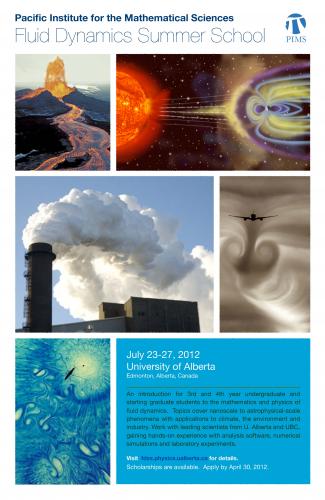Fluid Dynamics Summer School
Topic
In the course of one week, students will learn fundamental principles and methods in lectures while working with leading scientists from the University of Alberta and the University of British Columbia, gaining hands-on experience with analysis software, numerical simulations and laboratory experiments. Topics cover nanoscale to astrophysical-scale phenomena with applications to climate, the environment and industry.
Speakers
Details
The summer school is intended for senior undergraduates, Masters students and starting PhD students having a strong background in mathematics, physics and/or engineering. No prior knowledge of fluid dynamics is necessary. However, the students should have taken at least one course in partial differential equations by the summer of 2012.
Scholarships are available. Apply by April 30, 2012.
Additional Information
Survey:
Please help PIMS to improve the quality of its events and plan for the future by filling out this quick and painless survey.
Visit http://fdss.physics.ualberta.ca/ for details.
- Neil Balmforth,
Dept. Mathematics, University of British Columbia
Geophysical Fluids (magma flows, stratified shear flow, tides) - Morris Flynn,
Dept. Mechanical Engineering, University of Alberta
Environmental Fluids (plumes and flares, ventilation, gravity currents) - Ian Frigaard,
Depts. of Mathematics and of Mechanical Engineering, University of British Columbia
Industrial Fluids (cementing, bubbles and particles, visco-plastic fluids) - G. M. "Bud" Homsy,
Depts. of Mathematics and of Mechanical Engineering, University of British Columbia
Interfacial Fluid Dynamics (phenomena and flows, microfluidics) - Bruce Sutherland,
Depts. of Physics and of Earth & Atmospheric Sciences,
University of Alberta
Mathematical Methods of Fluid Dynamics (interpretation of equations, approximation methods, vorticity, waves) - Rick Sydora,
Dept. Physics, University of Alberta
Astrophysical Fluids (electromagnetic effects, aurorae, solar wind and the magnetosphere)

